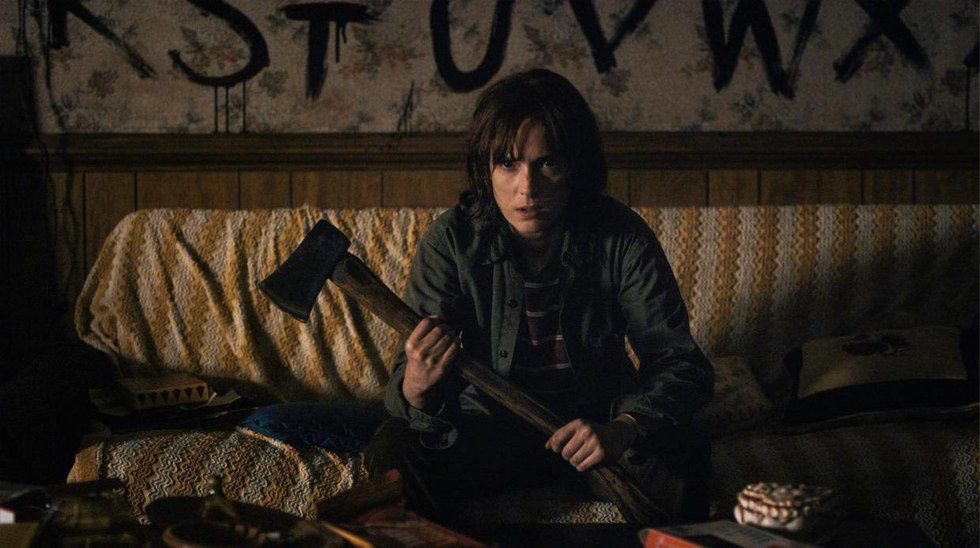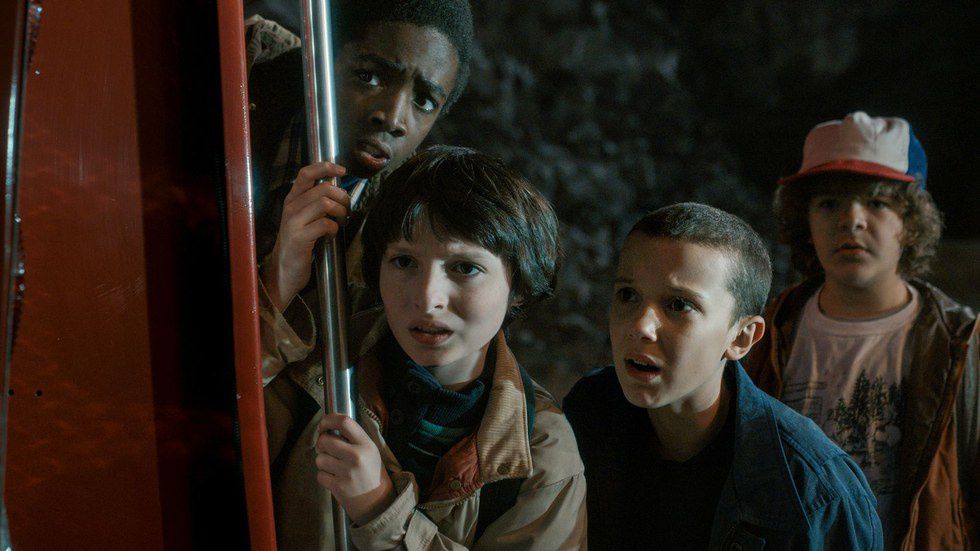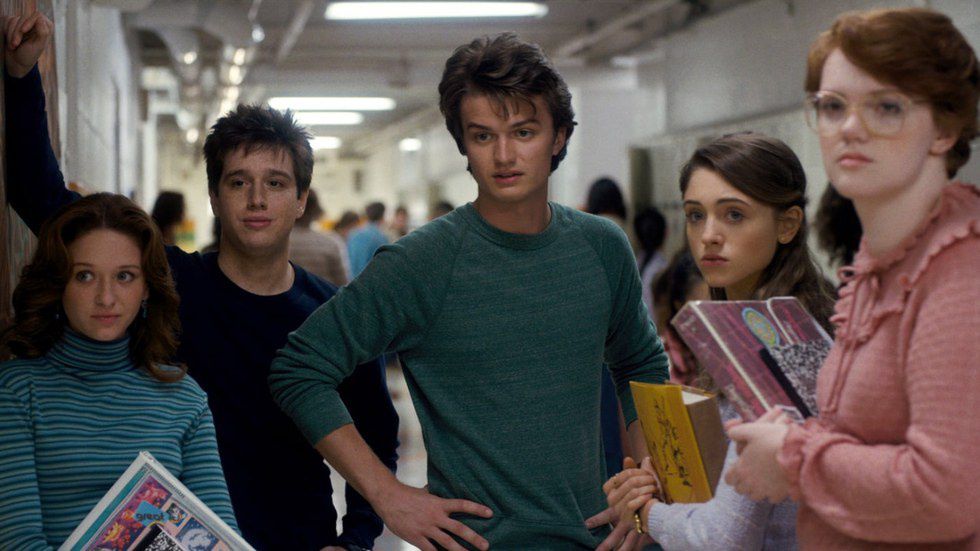During the past few years, a growing band of filmmakers who were raised on the genre classics of the late 70's and early-to-mid 80's have used their talents to create cinematic love letters to the popcorn-fueled treasures of their childhoods. Few of them, including J.J. Abrams, who saluted the films of his juvenescence with "Super 8," have managed to find that sweet spot between nostalgic inspiration and bold originality in order to please today's generation of viewers as well as their own. "Stranger Things," the latest binge-worthy craze on Netflix from the Duffer Brothers (Matt and Ross), is perhaps the ultimate tribute to the beloved period of big screen entertainment. In fact, it is so stuffed with references, archetypal characters and recycled imagery that I truly wonder if there are enough of them left for other 80s-bred filmmakers to use in future projects.
This is what bugged me about the series, which is essentially a seven-hour film split into eight parts. While I did find "Stranger Things" enjoyable for all its wallowing in heavy nostalgia, I was too often distracted by nearly every intertextual nod and wink the Duffer Brothers baked into each episode. Don't get me wrong, I enjoy a good throwback as much as anyone, but when they come as hurriedly and as frequently as they do here, it distracts seasoned viewers like myself from just about every other aspect of this otherwise exceptionally crafted sci-fi mystery thriller. There are some good performances and clever dialogue scenes to boot, but "Stranger Things" is simply too self-conscious to be considered as anything more than a well-intended exercise in crowd-pleasing and self-indulgent film making.
We are given the first of many homages right off the bat when a scientist at Hawkins National Laboratory is seen sprinting away from an unseen alien thing. Later that night, 12-year-old Will Byers (Noah Schnapp) and his small band of goonies, Mike (Finn Wolfhard), Lucas (Caleb McLaughlin) and Dustin (Gaten Matarazzo), leave their game of Dungeons & Dragons on a cliffhanger to turn in for the night. As they bike their way to their separate homes, Will is driven off road and abducted by the menacing creature without a trace. The search for the boy begins with his emotionally frail mother, Joyce (Winona Ryder), his socially awkward older brother, Jonathan (Charlie Heaton), and the neighborhood's disgruntled police chief, Jim Hopper (David Harbour).
As the plot thickens, others become involved in the investigation, such as Mike, Lucas and Dustin, who in one scene trail along railroad tracks like the boys in "Stand By Me" in search of their missing friend. Soon after they start sneaking out of their parents' line of sight, they run into an odd girl known only as Eleven (Millie Bobby Brown), who may as well be akin to a certain extra-terrestrial, as she possesses some unique abilities. Mike's older sister, the studious Nancy (Natalia Dyer), and her horny-yet-sensitive boyfriend Steve (Joe Keery, who resembles a young Johnny Depp from "A Nightmare On Elm Street") are also pulled into the mystery when they experience some eerie close encounters with the bloodthirsty stalker.
Those of you who caught my own references in those last two paragraphs will know exactly what you’re in for before you start binge watching the show. Even the most memorable moments in “Stranger Things” fail to stand entirely on their own since they are not much more than retreads of their classic inspirations. Thankfully, these references (as blatant as they are at times) are made tolerable through the Duffer Brothers’ impressive efforts to stitch them all together into a cohesive story. There are three or four different subplots, each one taking inspiration from a different set of 80's flicks, yet they all share a consistent tone that never changes when one subplot cuts to another.
As I mentioned before, the adventures of Mike, Lucas, Dustin and the mysterious Eleven borrow elements from “E.T. the Extra-Terrestrial,” “The Goonies” and “Stand By Me.” There is that joyous essence of childhood wish-fulfillment bursting from each frame as they trek through their quiet little suburbia, uncovering the wonders and dangers of their journey, and all the excitement that comes with it. The young actors are more than capable of handling the bulk of what “Stranger Things” has to offer as far as character development is concerned. The boys are all great, but it is Millie Bobby Brown who absolutely earns every second of screen time as Eleven, communicating almost every facet of the emotional spectrum with limited dialogue and facial expression. It’s an intensely committed performance.
Their journey is mirrored by the more pubescent escapades of Nancy, Jonathan and Steve, whom the Duffer Brothers put through a gauntlet of horror/slasher film tropes. The three teens face both external and internal challenges, struggling to form their own sense of self and self-confidence as they edge closer and closer to adulthood. Nancy (played exquisitely by Dyer) appears to be the quintessential good girl with a healthy curiosity for physical intimacy, but as she progresses through each episode, we learn there is much more to her, as her attitude fluctuates between scenes with the cocky Steve and scenes with the more timid Jonathan.
By far the best work in “Stranger Things” comes from Ryder as Joyce. There have been more than enough genre films with hysterical parents faced with the seemingly hopeless attempt to convince others that whatever supernatural occurrences they’re experiencing are 100% real and not mere delusions. We the audience know for a fact that Joyce isn’t crazy, but I for one would have loved to see the Duffer Brothers toy with that assumption in order to keep us guessing. Ryder, who ironically enough began her career during the same decade the series is set, brings the right amount of gravitas and grief-stricken anxiety without ever overdoing it.
Attention to period detail is also stellar, though the creative efforts of the conceptual artists feel a bit stilted. The monster, which is meant to be a terrifying abomination, looks surprisingly uninspired for a show that is so keen on stimulating our imagination (something that it never quite succeeds in). I really wish I had more praise for this show, since it is so clearly a labor of love on the part of its creators, cast and crew. Yet for all its good intentions and its passionately pastiched structure, “Stranger Things” cannot reach any artistic level above admirable imitation.























